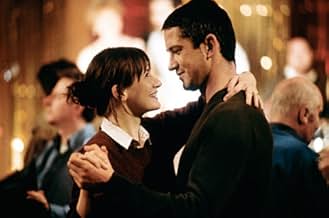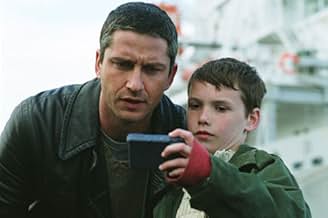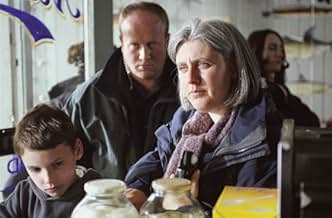Adicionar um enredo no seu idiomaAfter having responded to her son's numerous letters in the guise of his father, a woman hires a stranger to pose as his dad when meeting him.After having responded to her son's numerous letters in the guise of his father, a woman hires a stranger to pose as his dad when meeting him.After having responded to her son's numerous letters in the guise of his father, a woman hires a stranger to pose as his dad when meeting him.
- Indicado para 1 prêmio BAFTA
- 9 vitórias e 8 indicações no total
- Librarian
- (as Elaine Mackenzie Ellis)
Avaliações em destaque
We are swept into both sides of an unusual epistolary relationship -- one between a mother and son, as each takes on alternative identities to communicate, and we get to hear their adopted voices as well.
The son is an isolated deaf kid who won't talk but pours out his heart in letters, while his fiercely protective mother pretends to be his fictional seagoing dad in response. We are drawn into their parallel stories from each perspective, as their defensively claustrophobic relationship has an outlet in this fictional geography as they gradually start dealing with the real world.
Emily Mortimer combines strength and naked vulnerability, as she did in "About Adam" and "Lovely and Amazing," while the son is captivating in an almost mimed role without being as treacly as the kid playing Peter in "Finding Neverland." Debut director Shona Auerbach keeps the movie tethered to reality with evocative use of Glasgow and its active port. We are anchored in a working class bloke territory that becomes a rocky shore for an untethered single mom living with her mother and her kid. This is tellingly symbolized when Mortimer braves a rough waterfront bar.
And then re-emphasized in a hotel tea parlor whose atmosphere electrically changes the minute rugged Gerard Butler pops up on screen. Epitomizing that cinematic manliness that is so talked about as lacking from most American actors these days, Butler's absolutely authentic masculinity instantly telescopes what this mother and child have been missing, and not just his sexual gravitas. Butler movingly demonstrates how a guy's guy plays paternal through such simple things as football, skipping stones, eating and of course dancing.
I don't know if I missed the clues to the concluding twists, but Hollywood would never let these lovely mysteries be, let alone as an achingly long look into each's eyes.
It's nice to see faces from Scottish TV shows in atypical roles, Sharon Small deservedly having a steady boyfriend on screen for a change, and Cal Macaninch, the nice guy from "Rockface" as the not nice guy here.
The Scots accents are thick and I did miss some punch lines in the dialog here and there.
The song selections are lovely, including a Damien Rice track that hasn't been overused yet.
The acting is superb, but the story is marvelous. It is a film with a not-so-simple message - one that moves the soul. One moment you are entertained with quick-witted humor, and the next moment your heart fills with compassion. It's simplicity is one of it's main high points and the absence of Hollywood "flash" is refreshing!
Heart-warming and pleasantly humorous - I would recommend it to anyone!
I loved it and plan on seeing it again. 5 stars for Dear Frankie!
Lori
Firstly, I am aghast at those who are not happy with films that produce an emotional reaction on the part of the movie-goer, as if to make an emotive piece of work is somehow limp or uncool or a cop-out. The best films are those that mirror humanity, whether that be in terms of violence committed by Man/Woman to Man/Woman, love, hate, envy, ambition and the others which make up the full range. Let us be clear: any film that deals with pain and heartbreak is not one that is choosing a soft option. How many of us do not feel pain and heartbreak? None of us presumably, so to state the obvious, this is valid ground for the modern writer and director to tread.
The difficulty for the film-maker in 2005 is finding the money to make a piece of work that is not compromised by commerce: to use music, action and dialogue in a clichéd manner to satisfy the warped idea of producers that the masses will only pay money for films that use such devices. Auerbach manages in this movie to almost completely avoid these pitfalls. There is no sex, no bulging orchestral interventions, no truly happy ending. I would however have removed the awful song by the awful Damien Rice and taken the dopey look off Emily Mortimer's face when she realised that the stranger was a decent guy as well as a bit of alright, but these in the end are trifles; for the director makes us emote without manipulation and without using plot devices which strain credulity (I don't care what any of you think).
Critics here are being too cynical. The searing melancholy of Bergman might satisfy them I suspect, but they seem to be missing the fact that there is precious little humour in this movie. The Mortimer character here is almost humourless enough for a Bergman movie, as is the Stranger for the most part, so the criticism of mawkishness isn't remotely credible. The mother is also a fairly grim presence. Auerbach could easily have tweaked her film to emphasise or exaggerate the sense of internal pain of all three leads, but she happily and smartly eschews still shots of these nomadic characters wallowing in their isolation. Instead, their internal lives are displayed with a greater sense of reality. There is a humdrum quality to their lives which is as it should be if a director is shooting for naturalism. Contrast this with Leigh's Vera Drake where for more verisimilitude, there should have been more dirt, more roughness to the people and their homes. True the working class often prided themselves on cleanliness, but in the terraced house in Tottehnam I encountered in the late-50s and early-60s you smell the lack of true cleanliness and see it too.
In terms of characterisation Auerbach also got things right. Far from The Stranger being too handsome, handsome people can be found anywhere, and he's a scruff! Furthermore, the idea that he is Mr Perfect is risible. He is emotionally stunted initially, callous and unfeeling in his first meeting with Mortimer, and for me - not that I know any seaman - is plausibly detached from regular land life. The criticism seems to be that is implausibly seduced by the admittedly dysfunctional family unit. I don't buy that. His inability to relate to the child when they meet for the first time is either perfect or too much, but he's anything like the Disneyland father- manqué some reviewers here are suggesting. Auerbach has him thawing out very slowly. The movie too slow? A slicker 95 minute version wouldn't have allowed this. If some viewers have a retarded attention span that's their lookout.
That the Stranger is won over is not feel-good nonsense, it's entirely believable and well executed. Why? Because the father instinct is in all men. He responds to this splendid child in a way that is merely human. Sure, some men would not have responded, so go on, be cynical, but then there's no film. And if Mortimer's search for the surrogate father seems far-fetched, most of us can tell you miseries that the truth of everyday life is often far stranger than reality.
The denouement is magnificent. I'm rubbish at seeing twists coming in movies, and I saw this one accidentally. My reaction (look away if you've not seen the film) when the child first sees the "Father" was, 'he knows he's not his real Dad.' The direction is brilliant, the acting brilliant or Aerbach got lucky. In the end it doesn't matter; this key scene is superbly subtle however achieved.
There are indeed moving moments. The gift of the sea horse was profoundly affecting. The boy's talking to the Stranger to show how he felt about the crucial surrogate fathering that he's just received could for me also have been very, very upsetting. The direction of Frankie at this moment is fantastic: to keep his reaction under control is how we are: in our lives few lose control, weep hysterically or throw the punch. Frankie doesn't here, so tears us apart.
Finally, the real father: moral ambiguity? Life has many of these moments. I don't agree with the point anyway. Mortimer's reaction to the violent father is beautifully poised between the hard-heartiness part of her wants to show him and the dignified humanity the other part of her wants to reveal.
Such precious, subtle moments make for a tremendous piece of film-making. Fortunately most reviewers here liked the movie. If that weren't the case, we might as well all give up and start praying for the human race.
CWT
The acting is restrained, measured and true. I couldn't get much better than this.
It is true that it is emotionally laden but it is not all sadness, there is also humour, affection, and most importantly hope. If you find it too emotional you can always pretend that smoke got in your eyes.
Isn't the function of a good film to try and draw out emotions ? It is especially rewarding when these are positive and natural rather than base and specious.
An easy 10 out of 10
It has a unique and thoughtful storyline that is portrayed by the perfect combination of actors. There are no superstars or big names, just a group of people who want to make a film that pulls heartstrings which it does successfully. Dear Frankie gives you that rare feeling of sadness and happiness which is hard to forget.
It was a true masterpiece, the most near-perfect film that I have ever come across.It was the only film to ever bring tears to my eyes, which is quite a feat.
Você sabia?
- CuriosidadesJack McElhone (Frankie) is not deaf but worked with a speech coach so that his one spoken line would sound correct.
- Erros de gravaçãoWhen Lizzie is reading the last letter, it says "Thanks for the book" twice, but it is only read once.
- Citações
Lizzie: I had a good time tonight.
The Stranger: Don't sound so surprised.
[pause]
The Stranger: He's got your eyes. They... pull you right in.
Lizzie: Don't know what to say to that
The Stranger: You don't have to say anything.
Lizzie: You don't have to say nice things to me. I'm not paying you for that.
The Stranger: So why don't you want to hear them?
- Cenas durante ou pós-créditosSpecial thanks to ... all at Deaf Connections, ... all at Sigma Films, ... Esther and Harvey ...
- Trilhas sonorasEveryone Will Have Their Day
Written by Michael Clarke & Martin Terefe
Published by (Copyright Control) Sony/ATV Music Publishing, Ltd.
Performed by Michael Clarke (as Clarksville)
© 2003 Wildstar Records, Ltd.
Principais escolhas
Detalhes
- Data de lançamento
- País de origem
- Centrais de atendimento oficiais
- Idiomas
- Também conhecido como
- Dear Frankie
- Locações de filme
- Empresas de produção
- Consulte mais créditos da empresa na IMDbPro
Bilheteria
- Faturamento bruto nos EUA e Canadá
- US$ 18.025
- Fim de semana de estreia nos EUA e Canadá
- US$ 37.542
- 6 de mar. de 2005
- Faturamento bruto mundial
- US$ 1.656.829
- Tempo de duração1 hora 45 minutos
- Cor
- Mixagem de som
- Proporção
- 1.85 : 1





























